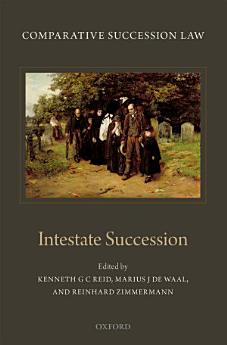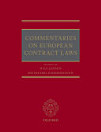Comparative Succession Law: Volume II: Intestate Succession
Kenneth Reid · Marius de Waal · Reinhard Zimmermann
Aug 2015 · OUP Oxford
Ebook
490
Pages
family_home
Eligible
info
reportRatings and reviews aren’t verified Learn More
About this ebook
Intestate Succession is the second volume in the Comparative Succession Law series which examines the principles of succession law from a comparative and historical perspective. This volume discusses the rules which apply where a person dies either without leaving a valid will, or leaving a will which fails to dispose of all of the person's assets. Among the questions considered are the following: What is the nature of the rules for the disposal of the deceased's assets? Are they mechanical or is there an element of discretion? Are particular types of property dealt with in particular ways? Is there entitlement to individual assets (as opposed to money)? Do the rules operate in a parentelic system or a system of some other kind? Are spouses treated more favourably than children? What provision is made for extra-marital children, for adopted children, for step-children? Does cohabitation give rise to entitlement? How are same-sex couples treated? Broader questions also arise of a historical and comparative nature. Where, for example, do the rules in intestate succession come from in particular legal systems? Have they been influenced by the rules in other countries? How are the rules explained and how are they justified? To what extent have they changed over time? What are the long-term trends? And finally, are the rules satisfactory, and is there pressure for their reform? As in the first volume, this book will focus on Europe and on countries which have been influenced by the European experience such as Australia, New Zealand, South Africa, the United States of America, Quebec, and the countries of Latin America. Further chapters are devoted to Islamic Law and Nordic law. Opening with a discussion on Roman law and concluding with an assessment of the overall development of the law in the countries surveyed, this book will provide a wider reflection on the nature and purpose of the law of intestate succession.
About the author
A qualified solicitor, Kenneth Reid has taught at the University of Edinburgh since 1980. He was appointed to the Chair of Property Law in 1994 and to the Chair of Scots Law in 2008. From 1995 to 2005 he served as a Scottish Law Commissioner, where he was responsible for a major programme of reform of land law, which has now been implemented by legislation. Marius de Waal is Professor of Private Law at the University of Stellenbosch. His main fields of interest are the law of succession and the law of trusts, on which he has written a number of textbooks, including co-authoring the fifth edition of Honoré's South African Law of Trusts (Juta 2002, with Edwin Cameron, Basil Wunsh and Peter Solomon). Reinhard Zimmermann is a Director of the Max Planck Institute for Comparative and International Private Law in Hamburg and is Chairman of the Social Sciences, Arts, and Humanities Division of the Max Planck Society. He is the author of numerous books on comparative law and legal history, including The Law of Obligations (OUP, 1996) and The New German Law of Obligations (OUP, 2005).
Rate this ebook
Tell us what you think.
Reading information
Smartphones and tablets
Install the Google Play Books app for Android and iPad/iPhone. It syncs automatically with your account and allows you to read online or offline wherever you are.
Laptops and computers
You can listen to audiobooks purchased on Google Play using your computer's web browser.
eReaders and other devices
To read on e-ink devices like Kobo eReaders, you'll need to download a file and transfer it to your device. Follow the detailed Help Center instructions to transfer the files to supported eReaders.





